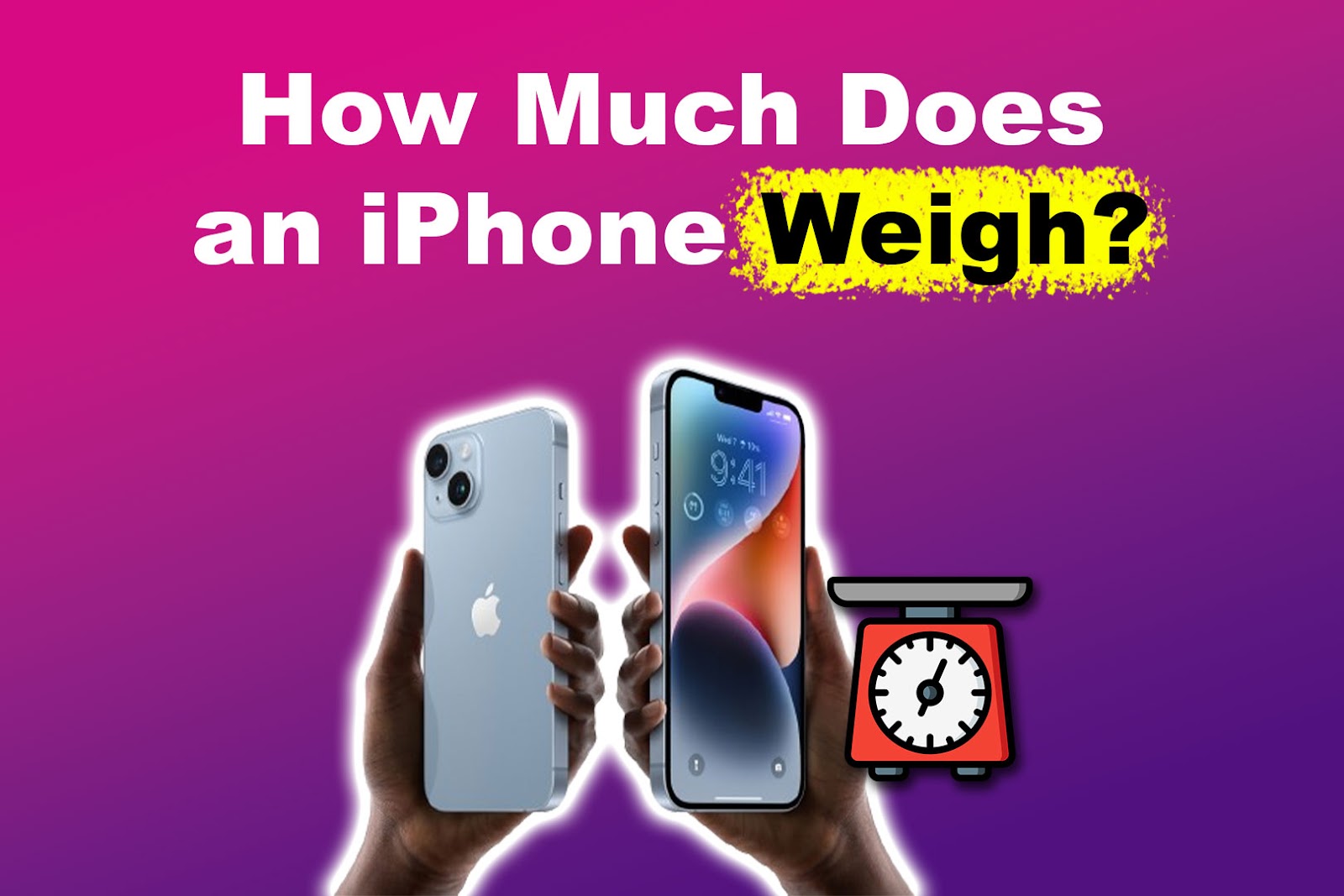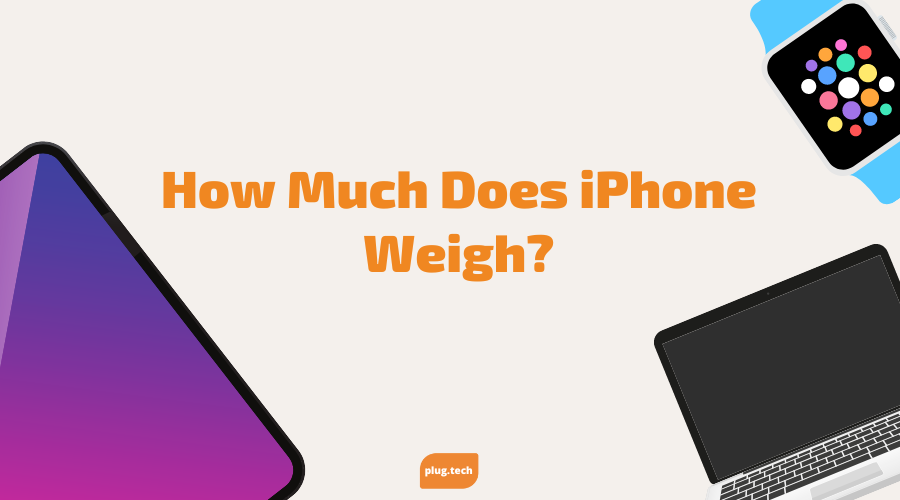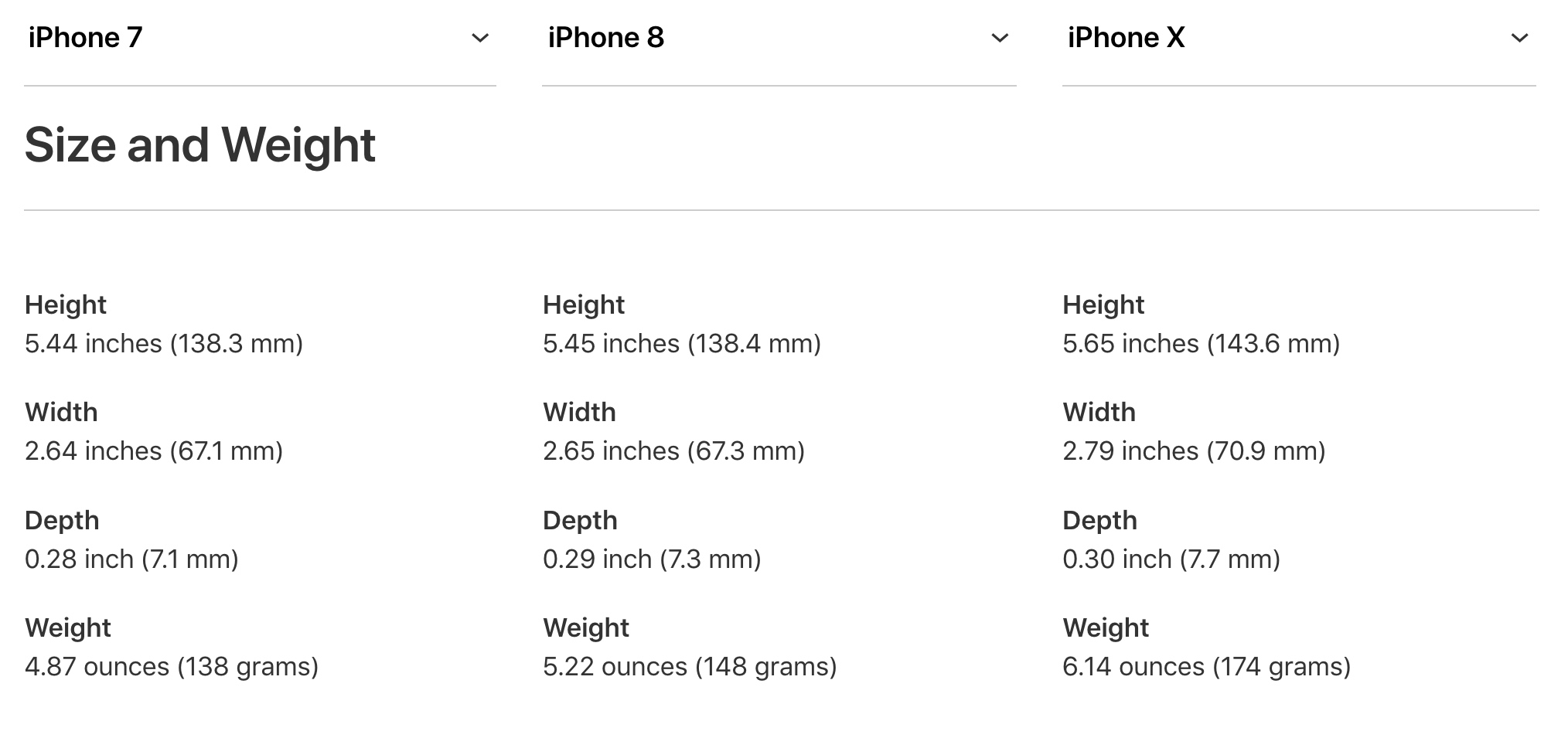How Much Does an iPhone Weigh? The iPhone 14 weighs approximately 6.07 ounces (172 grams). The iPhone 14 Pro weighs around 7.27 ounces (206 grams).
IPhones are renowned for their sleek design and advanced features. Weight plays a crucial role in the overall user experience. A lighter phone offers better portability, while a slightly heavier one may feel more premium. The weight of an iPhone can impact your daily interactions, from ease of use to comfort during extended periods of holding.
Apple’s attention to weight and balance ensures that each model offers a seamless blend of durability and usability. Whether you’re considering the latest model or a previous generation, knowing the weight can help you make an informed decision.
How Much Does an iPhone Weigh?

Iphone Weight Overview
The weight of an iPhone can influence its feel and usability. Over the years, Apple has released many iPhone models. Each has a different weight. This section provides a detailed look at how iPhone weight has changed over time. It also focuses on the current models and their weights.
Historical Weight Trends
iPhone weight has varied since the first model. Let’s look at some historical data.
| Model | Weight (grams) |
|---|---|
| iPhone (2007) | 135 |
| iPhone 3G (2008) | 133 |
| iPhone 4 (2010) | 137 |
| iPhone 5 (2012) | 112 |
| iPhone 6 (2014) | 129 |
Earlier iPhone models were heavier. Over time, Apple reduced the weight. The iPhone 5 was the lightest at 112 grams.
Current Models
Apple’s latest iPhones have different weights. Here is a list of the current models:
- iPhone 13: 174 grams
- iPhone 13 Mini: 140 grams
- iPhone 13 Pro: 204 grams
- iPhone 13 Pro Max: 238 grams
The iPhone 13 Pro Max is the heaviest current model. The iPhone 13 Mini is the lightest.
Understanding the weight helps in choosing the right iPhone. Some prefer lighter phones. Others like the sturdy feel of heavier models. Always check the weight before buying.
Factors Influencing Iphone Weight
The weight of an iPhone can vary based on several factors. Understanding these factors helps in knowing why different models weigh differently. Here are the key factors influencing the weight of an iPhone:
Material Choices
The materials used in an iPhone significantly impact its weight. Apple uses a mix of materials like aluminum, stainless steel, and glass. The type of metal used in the frame and the back cover’s material can make a big difference. For example, an iPhone with a stainless steel frame will weigh more than one with an aluminum frame.
- Aluminum: Lighter but less durable.
- Stainless Steel: Heavier and more durable.
- Glass: Adds weight but enables wireless charging.
Battery Size
The size of the battery also plays a crucial role in determining the iPhone’s weight. Larger batteries provide longer usage time but add more weight to the device. Newer models often have larger batteries to support more features.
| iPhone Model | Battery Capacity (mAh) | Weight (grams) |
|---|---|---|
| iPhone 12 Mini | 2,227 | 135 |
| iPhone 12 | 2,815 | 164 |
| iPhone 12 Pro Max | 3,687 | 228 |
As seen in the table, an increase in battery capacity usually results in a heavier iPhone. Bigger batteries are essential for power-hungry features, but they also add to the overall weight.
Comparing Iphone Weights

Understanding the weight of an iPhone is essential. It affects portability and ease of use. Let’s compare iPhone weights and see how they stack up against competitors and different models.
Iphone Vs. Competitors
iPhones are popular for their sleek design and advanced features. But how do they weigh in comparison to other smartphones? Here’s a quick look:
| Smartphone | Weight (grams) |
|---|---|
| iPhone 13 | 174 |
| Samsung Galaxy S21 | 169 |
| Google Pixel 6 | 207 |
| OnePlus 9 | 192 |
The table shows the iPhone 13 weighs 174 grams. It is slightly heavier than the Samsung Galaxy S21. The Google Pixel 6 is heavier than both.
Different Models
iPhones come in various models and sizes. Each model has a different weight. Let’s look at some popular models:
- iPhone SE (2020): 148 grams
- iPhone 12: 164 grams
- iPhone 12 Pro: 189 grams
- iPhone 12 Pro Max: 228 grams
The iPhone SE (2020) is the lightest model. The iPhone 12 Pro Max is the heaviest. This information helps when choosing the right model for your needs.
Impact Of Weight On User Experience
The weight of an iPhone significantly affects the user experience. Whether you’re carrying it in your pocket or using it for extended periods, the device’s weight plays a crucial role in its overall usability and portability.
Portability
Portability is key for a device you carry everywhere. A lighter iPhone slips easily into pockets or bags. It reduces the bulk you carry daily. Students, professionals, and travelers benefit from a lightweight device. They can move around without feeling weighed down.
Below is a comparison table highlighting the weights of different iPhone models:
| iPhone Model | Weight (grams) |
|---|---|
| iPhone 13 Mini | 140g |
| iPhone 13 | 174g |
| iPhone 13 Pro | 204g |
| iPhone 13 Pro Max | 238g |
From the table, you can see the weight difference between models. Choose a model that fits your portability needs.
Usability
A heavy iPhone can strain your hand during prolonged use. Usability becomes challenging with a bulkier device. Gaming, reading, or browsing feels tiring with a heavier phone. A lighter iPhone enhances the user experience by reducing physical strain.
Consider the following benefits of a lighter iPhone for usability:
- Comfortable grip for extended use
- Less wrist fatigue during long calls or video chats
- Easier handling for children and seniors
These factors make a lightweight iPhone a better choice for daily tasks. Always check the weight before buying. It ensures the device meets your usability expectations.
Weight And Durability
The weight of an iPhone often raises questions about its durability. A heavier phone might seem sturdier, but what about the actual impact of weight on durability? Let’s explore the different aspects of weight and durability of iPhones.
Drop Resistance
Drop resistance is vital for any smartphone. A heavier phone might feel solid, but it can also impact how it handles falls. Below is a table showing the drop resistance of various iPhone models:
| iPhone Model | Weight (g) | Drop Resistance |
|---|---|---|
| iPhone 12 | 164 | High |
| iPhone 12 Pro | 189 | Very High |
| iPhone 12 Pro Max | 228 | Extremely High |
As shown, heavier models like the iPhone 12 Pro Max have extremely high drop resistance. This is due to the extra material and build quality.
Material Strength
The materials used in iPhones also play a crucial role in durability. Here is a list of materials used in recent iPhone models:
- Aluminum – Used in iPhone 12 and 12 Mini
- Stainless Steel – Used in iPhone 12 Pro and 12 Pro Max
- Glass – Used in all recent models for front and back
Aluminum is light and strong, but stainless steel is heavier and more robust. Glass is essential for aesthetics and functionality but needs to be toughened.
Using these materials, Apple ensures that the iPhone remains durable without compromising on weight. For example:
- Aluminum makes the iPhone light and durable.
- Stainless Steel adds weight but increases durability.
- Glass provides a sleek finish while maintaining toughness.
Overall, the balance of weight and material strength makes iPhones both durable and user-friendly.
Future Trends In Iphone Weight
The weight of an iPhone has always been a key factor for users. Each new model brings subtle changes, making it essential to understand future trends. In this section, we’ll explore predicted changes and innovative materials that could shape the future of iPhone weight.
Predicted Changes
Apple consistently works on making iPhones lighter and more efficient. Future iPhones will likely weigh less due to advanced technology.
| Model | Weight |
|---|---|
| iPhone 13 | 174 grams |
| Future iPhone | Less than 150 grams |
Predicted changes include the use of smaller components and better battery technology. Lighter batteries will reduce the overall weight significantly.
Innovative Materials
Innovative materials play a big role in reducing weight. Future iPhones might use materials like graphene and carbon fiber.
- Graphene: Strong and lightweight.
- Carbon Fiber: Durable and light.
These materials can make iPhones both lighter and more durable. Apple may also use advanced aluminum alloys to keep the weight low.
Future trends in iPhone weight will focus on using these materials smartly. This ensures the phone remains light without compromising on strength.
Consumer Preferences
Understanding how much an iPhone weighs matters to many people. Consumers want a phone that feels comfortable in their hand. They also care about the weight for travel and portability reasons. The weight of an iPhone affects its usability and appeal. Let’s explore what market research and user feedback reveal about this.
Market Research
Market research shows that weight is a key factor for buyers. Lightweight phones are often preferred. This is because they are easier to carry. Heavy phones can feel cumbersome and tiring to hold. Let’s look at some data:
| iPhone Model | Weight (grams) |
|---|---|
| iPhone 13 Mini | 140 |
| iPhone 13 | 174 |
| iPhone 13 Pro | 204 |
| iPhone 13 Pro Max | 238 |
As seen in the table, the weight varies across models. This variation impacts consumer choices. People looking for lighter phones might choose the iPhone 13 Mini.
User Feedback
User feedback highlights that weight affects user satisfaction. Many users prefer a phone that is not too heavy. Here are some common comments:
- “I love my iPhone 13 Mini. It’s so light and easy to carry.”
- “The iPhone 13 Pro Max is great, but it’s a bit heavy.”
- “A lighter phone fits better in my pocket.”
These comments show a clear preference for lighter phones. A lightweight phone is often more comfortable for daily use. Users also find it easier to carry around all day.
Environmental Considerations
When discussing the weight of an iPhone, it’s crucial to address the environmental considerations. The materials and processes used in manufacturing impact the environment. This section dives into recycling impact and sustainable materials.
Recycling Impact
Recycling an iPhone can significantly reduce environmental harm. Each iPhone contains valuable materials like gold, silver, and copper. Recycling helps recover these precious metals. This process decreases the need for mining, which is harmful to the environment.
Recycling also reduces electronic waste. E-waste can release harmful chemicals into soil and water. Proper recycling prevents these toxins from polluting our planet. Apple has taken steps to improve their recycling processes. They aim to make recycling iPhones as easy as possible.
| Material | Recycling Benefit |
|---|---|
| Gold | Reduces need for new mining |
| Silver | Prevents soil contamination |
| Copper | Decreases electronic waste |
Sustainable Materials

iPhones are made with sustainable materials to lessen environmental impact. Apple uses recycled aluminum for iPhone casings. This practice reduces the need for raw materials. Recycled aluminum has a lower carbon footprint compared to new aluminum.
Apple also uses recycled tin in their soldering process. This choice saves natural resources and lessens environmental damage. They have committed to using 100% recycled tin in future products. These initiatives help protect our environment.
- Recycled Aluminum: Lowers carbon footprint
- Recycled Tin: Saves natural resources
These efforts show Apple’s dedication to sustainability. Their use of recycled materials makes a positive environmental impact.
Conclusion
Knowing the weight of an iPhone helps in making an informed purchase decision. Different models have varying weights, affecting portability and user experience. Always check the specific weight of the model you are interested in. This ensures you get the perfect iPhone that meets your needs.
Happy shopping!



